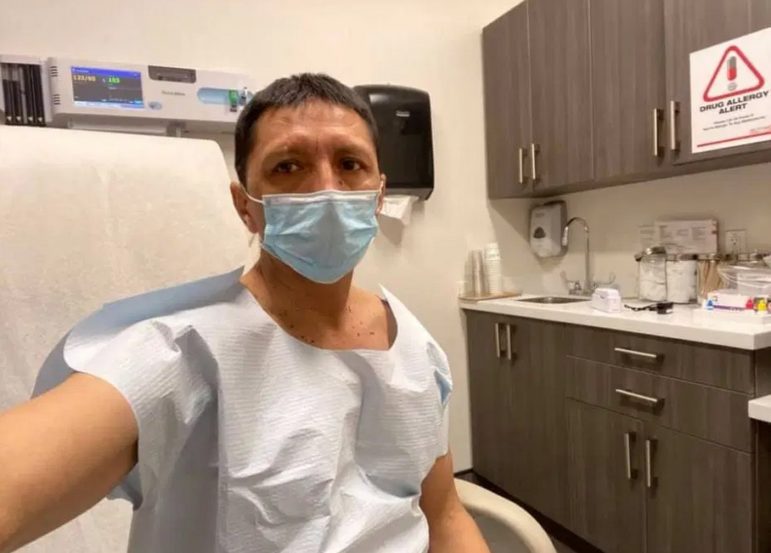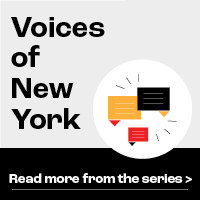
Courtesy El Diario
Ecuadorian activist Walter Sinche is recovering from COVID-19.Read the original story in Spanish at El Diario
Translated and condensed by Carlos Rodríguez Martorell
Since March 10, when her father Carlos Burgos, 82, was diagnosed with coronavirus at Elmhurst Hospital in Queens, Ecuadorian journalist Virginia Burgos, 55, and her family have experienced a ‘triple ordeal’: Her uncle died from COVID-19 in New York and a cousin was also a victim last week in Guayaquil, Ecuador, one of the Latin American cities most ravaged by the epidemic.
“It’s been a couple of weeks of desperation and sadness, as this epidemic has finally exposed the frailty of our society and the health care systems worldwide,” said Burgos. “And we Ecuadorian immigrants have to suffer a double anguish: First, because of what we are enduring here in the city, and second because our hearts break because of the situation in Ecuador.”
As one of the most vibrant Hispanic communities in New York, Ecuadorians live mainly in the Queens neighborhoods of Corona, Jackson Heights and Elmhurst, comprising one of the areas hit hardest by COVID-19, not only in the city but across the nation.
Although he doesn’t have official statistics, activist Walter Sinche, founder of Alianza Ecuatoriana Internacional in Corona, is certain that a large portion of Latinos affected by COVID-19 in Queens are Ecuadorians.
“We get informal reports every day. Our people are being heavily affected by this sickness, here and there,” said the activist. Sinche himself is recovering from the virus, which has left him in bed for the past three weeks.
Construction worker Ramiro Pazminio, 45, who lives in Jackson Heights, has not stopped going to work at a Brooklyn site, as he says the work has been classified as “essential.”
“Many of my colleagues are sick, and every day fewer and fewer show up for work. I take precautions when I’m on the subway, but with this virus you never know. My older daughter is in Guayaquil. I just learned this morning that my ex wife is sick, and they live together. This is nerve-wracking, brother!” said Ramiro, as he shared an experience that seems to find an echo in every corner of Queens.
Elmhurst Hospital, one of the city’s 11 public hospitals, has been dubbed the “epicenter of the epicenter” of the emergency. Only two weeks into the pandemic, the health center showed signs of collapse as the site receiving the most coronavirus patients in the five boroughs.
Burgos was a first-hand witness the facility’s strain. “My father started experiencing respiratory problems and was checked in at Elmhurst Hospital,” she said. “We are talking about one of the first cases, when barely 22 people had tested positive [in the city]. Still, we went through some very unpleasant situations because of the lack of communication with the doctors. The whole staff was overwhelmed.”
Her father, who lives at a Catholic Charities senior home in Corona, is now recovering at a rehabilitation center in Rego Park, after being in intensive care. He left behind the worst of the virus, but now he can’t walk or talk. He suffers from Alzheimer’s and Parkinson’s diseases.
“The hospital treatment was inhuman; once he was hospitalized we didn’t hear from him. It was impossible to communicate with the doctors. Not even a text message,” Burgos explained.
Burgos said the phone became the only refuge for her and her sisters Lorena and Ana Julia, as they faced not only the emotional challenge of not knowing anything about their father in ICU for more than 10 days, but also as they closely followed the harrowing news about the epidemic 2,989 miles away, in their native Ecuador.
“As we endured the doctors’ radio silence about my father’s health, we also had our hearts and minds back home, where the coronavirus has generated a lot of suffering. My cousin Guido Zambrano, 80, died in Guayaquil last week in the midst of a disaster that is even worse than what the media is showing here,” she said.
By April 1, the Guayas province, where Guayaquil is, had officially reported more COVID-19 victims than some entire Latin American nations, with 80 dead and 1,937 infected. Those numbers, however, do not include the victims who died before being tested.
The Burgos sisters mourned their cousin from New York, following their family’s ordeal through WhatsApp as they tried to bury him in Guayaquil.
“A while ago they had had the prevision of paying for the funeral services. And yet, they had to wait for five days because coffins had run out. Also, funeral services and cemeteries were suspended because of the number of deaths. They kept the body in the house, preserving him with formaldehyde until they finally got a spot in a cemetery out the city,” Burgos said.
The Burgos sisters’ uncle Bolívar Burgos, 74, also tested positive for the coronavirus and died last Saturday.
“At this time, I have my father in recovery; we have not been authorized to see him for the past week. Unfortunately, his younger brother died and we are still on a waiting list to be able to bury him, and we are living through all this while we are saddened by what’s going on in Ecuador,” she said.









